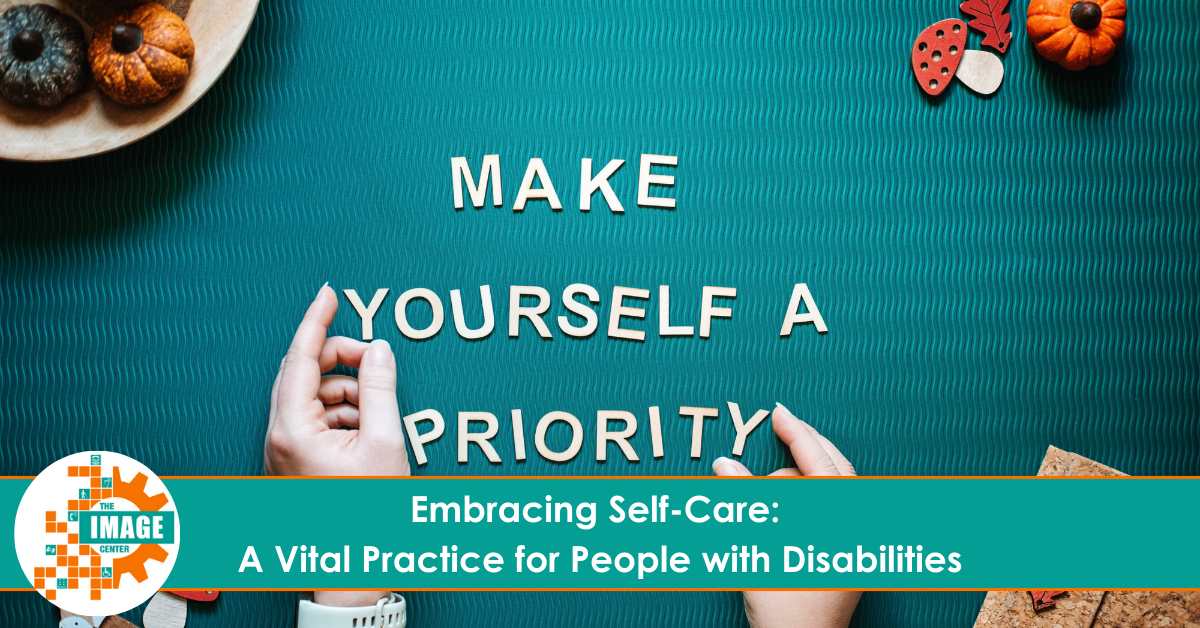At The IMAGE Center of Maryland, we believe that self-care is not just a luxury—it’s a necessity, especially for people with disabilities. During Self-Care September, we’re taking the time to highlight why prioritizing self-care is essential for health, independence, and overall well-being. Whether you’re navigating physical, sensory, or invisible disabilities, making self-care part of your routine can be empowering and transformative.
Why Self-Care Matters for People with Disabilities
Living with a disability often involves managing a variety of challenges, from physical health concerns to navigating accessibility in daily life. These demands can add stress, fatigue, and even mental health strain. Self-care is about giving yourself permission to recharge, both physically and emotionally, so you can maintain your independence and well-being. It’s a practice that allows you to not only care for yourself but to advocate for your needs, recognize your limits, and seek support when necessary.
For people with disabilities, self-care may also include managing specific health conditions, addressing mobility or sensory needs, and seeking accommodations that ensure equal access and participation in all areas of life. By embracing self-care, you’re making space for yourself to thrive, despite any obstacles that may arise.
Simple Self-Care Practices to Incorporate Into Daily Life
Self-care looks different for everyone, and there’s no “one-size-fits-all” approach. However, there are plenty of accessible, simple ways to begin practicing self-care in your daily routine:
1. Prioritize Rest and Sleep:
Quality sleep is essential for managing both physical and emotional health. Create a sleep routine that works for you—whether it’s using assistive devices like white noise machines or weighted blankets or setting up a restful environment with adaptive bedding that accommodates your needs.
2. Accessible Physical Activity:
Movement is a key part of self-care, and there are many adaptive exercises that can benefit people with disabilities. Chair yoga, water therapy, or seated strength exercises are just a few options to explore. Physical activity not only improves strength and mobility but also boosts mood and mental clarity.
3. Mindfulness and Relaxation Techniques:
Mental well-being is just as important as physical health. Practices like deep breathing exercises, progressive muscle relaxation, or mindfulness meditation can reduce anxiety, manage stress, and provide a sense of calm. Apps like Headspace and Insight Timer offer guided sessions with accessibility features to support users with different needs.
4. Create a Support Network:
One of the most powerful forms of self-care is recognizing that you don’t have to do it all alone. Whether it’s joining a peer support group through The IMAGE Center, reaching out to family and friends, or seeking counseling, having people in your corner is essential for emotional health.
5. Practice Boundary Setting:
For individuals with disabilities, setting boundaries is a critical form of self-advocacy and self-care. Whether it’s advocating for reasonable accommodations at work, taking a mental health day when needed, or declining tasks that may put unnecessary strain on your energy levels, honoring your limits helps protect your well-being.
Resources to Support Your Self-Care Journey
At The IMAGE Center, we’re dedicated to providing resources and support to help you live a more empowered, independent life. Here are a few places to start exploring additional self-care practices:
- The IMAGE Wellness Series: Our IMAGE Wellness Series offers virtual and in-person events focused on health, wellness, and self-care topics, designed specifically for the disability community. Join us for our next event on October 9, 2024: Beyond the Surface, Living with Invisible Disabilities. You can also read our health and wellness tips on our blog.
- Adaptive Fitness Programs: Local organizations like Disability Partnerships provide adaptive fitness programs and resources for people of all ability levels.
Mental Health and Disability Support: Organizations like Disability Rights Maryland offer resources and advocacy to support mental health, housing, and other rights for Marylanders with disabilities. Additionally, national organizations like the National Alliance on Mental Illness (NAMI) have support groups and mental health tools that are accessible for those with disabilities.
Remember: You Deserve Self-Care
Self-care is not selfish—it’s self-preservation. It’s about recognizing your value and taking steps to care for your body, mind, and spirit. At The IMAGE Center, we’re here to support you every step of the way as you prioritize your own well-being. As we celebrate Self-Care September, let’s all make a commitment to embrace self-care, empower ourselves, and ensure we’re nurturing the lives we deserve to live.For more information on how The IMAGE Center can support your self-care journey, contact us or explore our upcoming wellness events on our website

